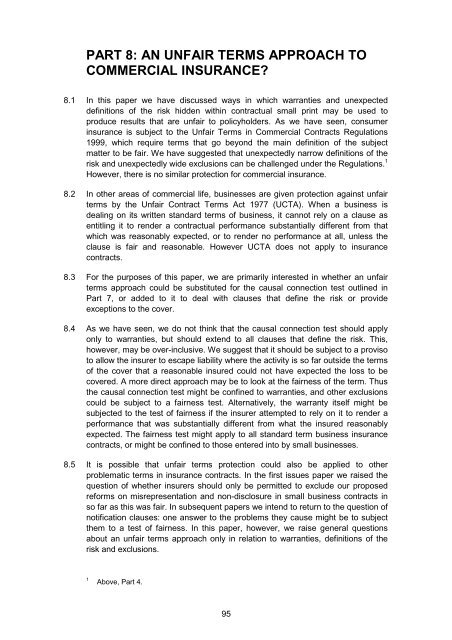Insurance Contract Law Issues Paper 2 Warranties - Law Commission
Insurance Contract Law Issues Paper 2 Warranties - Law Commission
Insurance Contract Law Issues Paper 2 Warranties - Law Commission
Create successful ePaper yourself
Turn your PDF publications into a flip-book with our unique Google optimized e-Paper software.
PART 8: AN UNFAIR TERMS APPROACH TO<br />
COMMERCIAL INSURANCE?<br />
8.1 In this paper we have discussed ways in which warranties and unexpected<br />
definitions of the risk hidden within contractual small print may be used to<br />
produce results that are unfair to policyholders. As we have seen, consumer<br />
insurance is subject to the Unfair Terms in Commercial <strong>Contract</strong>s Regulations<br />
1999, which require terms that go beyond the main definition of the subject<br />
matter to be fair. We have suggested that unexpectedly narrow definitions of the<br />
risk and unexpectedly wide exclusions can be challenged under the Regulations. 1<br />
However, there is no similar protection for commercial insurance.<br />
8.2 In other areas of commercial life, businesses are given protection against unfair<br />
terms by the Unfair <strong>Contract</strong> Terms Act 1977 (UCTA). When a business is<br />
dealing on its written standard terms of business, it cannot rely on a clause as<br />
entitling it to render a contractual performance substantially different from that<br />
which was reasonably expected, or to render no performance at all, unless the<br />
clause is fair and reasonable. However UCTA does not apply to insurance<br />
contracts.<br />
8.3 For the purposes of this paper, we are primarily interested in whether an unfair<br />
terms approach could be substituted for the causal connection test outlined in<br />
Part 7, or added to it to deal with clauses that define the risk or provide<br />
exceptions to the cover.<br />
8.4 As we have seen, we do not think that the causal connection test should apply<br />
only to warranties, but should extend to all clauses that define the risk. This,<br />
however, may be over-inclusive. We suggest that it should be subject to a proviso<br />
to allow the insurer to escape liability where the activity is so far outside the terms<br />
of the cover that a reasonable insured could not have expected the loss to be<br />
covered. A more direct approach may be to look at the fairness of the term. Thus<br />
the causal connection test might be confined to warranties, and other exclusions<br />
could be subject to a fairness test. Alternatively, the warranty itself might be<br />
subjected to the test of fairness if the insurer attempted to rely on it to render a<br />
performance that was substantially different from what the insured reasonably<br />
expected. The fairness test might apply to all standard term business insurance<br />
contracts, or might be confined to those entered into by small businesses.<br />
8.5 It is possible that unfair terms protection could also be applied to other<br />
problematic terms in insurance contracts. In the first issues paper we raised the<br />
question of whether insurers should only be permitted to exclude our proposed<br />
reforms on misrepresentation and non-disclosure in small business contracts in<br />
so far as this was fair. In subsequent papers we intend to return to the question of<br />
notification clauses: one answer to the problems they cause might be to subject<br />
them to a test of fairness. In this paper, however, we raise general questions<br />
about an unfair terms approach only in relation to warranties, definitions of the<br />
risk and exclusions.<br />
1 Above, Part 4.<br />
95

















